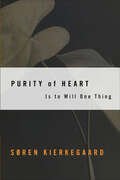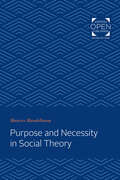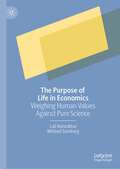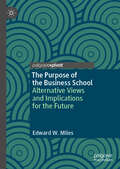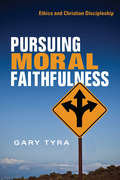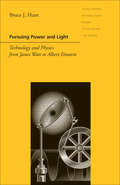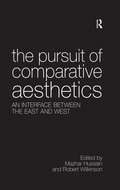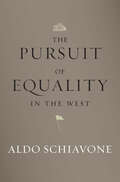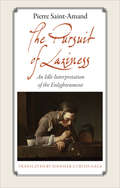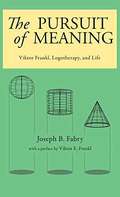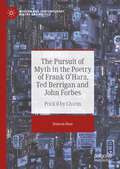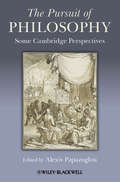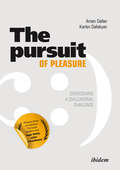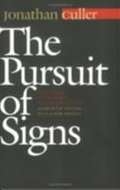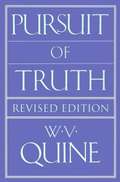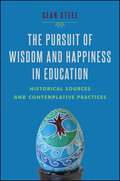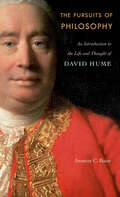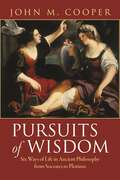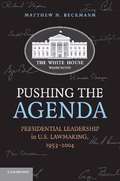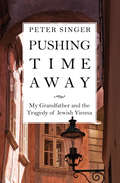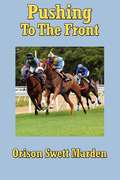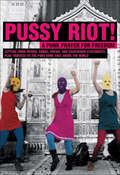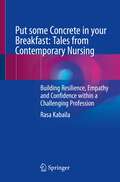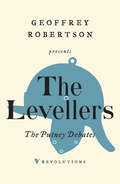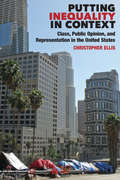- Table View
- List View
Purity of Heart: Is To Will One Thing
by Soren KierkegaardIn Kierkegaard’s view, faith is the most essential task of life. Faith is not a matter of dogmatic adherence, but rather of subjective passion. In Purity of Heart, Kierkegaard discusses multiple facets of human existence, particularly the responsibility of each person to single-mindedly seek out spiritual understanding and ethical integrity. While insisting that each reader must find their own path, Kierkegaard does offer clues to the nature of goodness. Søren Kierkegaard (1813-1855) was a Danish philosopher and theologian. Much of his work deals with religious problems such as faith in God, the institution of the Christian Church, Christian ethics and theology, and the emotions and feelings of individuals when faced with life choices. “About the greatness of the book there can be no question. It should be regarded as the equivalent of shock therapy.”—The Living Church
Purpose and Necessity in Social Theory
by Maurice MandelbaumOriginally published in 1987. Philosopher Maurice Mandelbaum offers a broad-ranging essay on the roles of chance, choice, purpose, and necessity in human events. He traces the many changes these concepts have undergone, from the analyses of Hobbes and Spinoza, through the eighteenth, nineteenth, and early twentieth centuries. Mandelbaum examines two contrary tendencies in the history of social theories. Some thinkers, he shows, have explained the character of institutions in terms of their individual purposes, whereas others have stressed relationships of necessity among society's institutions. Mandelbaum discusses chance, choice, and necessity at length and reaches some provocative conclusions about the ways in which they are interwoven in human affairs.
The Purpose of Life in Economics: Weighing Human Values Against Pure Science
by Lall Ramrattan Michael SzenbergThis book is a compilation of economic views on the purpose of life. It follows a unique approach, starting with propositions from diverse fields that act as governing laws of the purpose of life in economics, then guiding the reader through the physical, philosophical, and psychological views of the purpose of life, as economics and economic theories can find their roots in all these areas. The book concludes with the purpose of life presented through economic doctrines (from the pre-classical, to classical, to neo-classical schools of economic thought), through the lens of economic development, and from the perspective of several religious doctrines.
The Purpose of the Business School: Alternative Views and Implications for the Future
by Edward W. MilesIn the mid-20th century, university-based business schools re-oriented themselves to increased alignment with the preferences of the university and decreased alignment with the preferences of business. This re-alignment has caused multiple observers to question the effectiveness of current-day business schools. For example, recent discussions have lamented that business schools are engaged in research that does not influence the practice of business. This book engages these debates, arguing that all judgments about the effectiveness of business schools are rooted in assumptions about what the purposes of the business school appropriately are and that many of those assumptions are unstated and not subjected to debate. The author weaves a unique blend of complexity theory, philosophy of science, and the nature of professions to articulate those goals and assess the effectiveness at meeting them. The book traces parallel discussions regarding the purpose of the university in the writings of Aristotle and Wilhelm von Humboldt and ties those discussions to current debates. This book will inform business faculty and administrators of the degree to which university-based business schools are balancing multiple purposes which include discovery of knowledge, creating knowledge that informs the practice of business, training professionals, and instilling ethical principles in its training of those professionals.
Pursuing Moral Faithfulness: Ethics and Christian Discipleship
by Gary TyraChristianity is in a state of moral crisis. Even though people make moral decisions every day, many Christians lack both the ability to evaluate these decisions and a community of discipleship to help inspire a morally faithful life. Compared to the people around them, there is often no discernible difference in how Christians go about making moral choices. As a biblical and practical theologian with three decades of pastoral experience, who has also spent years teaching ethics to undergraduates, Gary Tyra approaches the topic with the practical goal of facilitating moral formation and encouraging an "everyday" moral faithfulness. Tyra argues that Christians can have confidence in their Christ-centered, Spirit-enabled ability to discern and do the will of God in any moral situation. Moral faithfulness follows from a life of Christian discipleship. In an age of moral apathy and theological confusion, Pursuing Moral Faithfulness is a breath of fresh air and a sign of hope for the future.
Pursuing Power and Light: Technology and Physics from James Watt to Albert Einstein (Johns Hopkins Introductory Studies in the History of Science)
by Bruce J. HuntIn the nineteenth century, science and technology developed a close and continuing relationship. The most important advancements in physics—the science of energy and the theory of the electromagnetic field—were deeply rooted in the new technologies of the steam engine, the telegraph, and electric power and light. Bruce J. Hunt here explores how the leading technologies of the industrial age helped reshape modern physics.This period marked a watershed in how human beings exerted power over the world around them. Sweeping changes in manufacturing, transportation, and communications transformed the economy, society, and daily life in ways never before imagined. At the same time, physical scientists made great strides in the study of energy, atoms, and electromagnetism. Hunt shows how technology informed science and vice versa, examining the interaction between steam technology and the formulation of the laws of thermodynamics, for example, and that between telegraphy and the rise of electrical science.Hunt’s groundbreaking introduction to the history of physics points to the shift to atomic and quantum physics. It closes with a brief look at Albert Einstein’s work at the Swiss patent office and the part it played in his formulation of relativity theory. Hunt translates his often-demanding material into engaging and accessible language suitable for undergraduate students of the history of science and technology.
The Pursuit of Comparative Aesthetics: An Interface Between the East and West
by Mazhar HussainComparative aesthetics is the branch of philosophy which compares the aesthetic concepts and practices of different cultures. The way in which cultures conceive of the aesthetic dimension of life in general and art in particular is revelatory of profound attitudes and beliefs which themselves make up an important part of the culture in question. This anthology of essays by internationally recognised scholars in this field brings into one volume some of the most important research in comparative aesthetics, from classic early essays to previously unpublished contemporary pieces. Ranging across cultures and time periods as diverse as ancient Greece, India and China and the modern West and Japan, the essays reveal both similarities and deep differences between the aesthetic traditions concerned. In the course of these expositions and comparisons there emerges the general conclusion that no culture can be fully grasped if its aesthetic ideas are not understood.
The Pursuit of Equality in the West
by Aldo SchiavoneOne of the world’s foremost historians of Western political and legal thought proposes a bold new model for thinking about equality at a time when its absence threatens democracies everywhere.How much equality does democracy need to survive? Political thinkers have wrestled with that question for millennia. Aristotle argued that some are born to command and others to obey. Antiphon believed that men, at least, were born equal. Later the Romans upended the debate by asking whether citizens were equals not in ruling but in standing before the law. Aldo Schiavone guides us through these and other historical thickets, from the first democracy to the present day, seeking solutions to the enduring tension between democracy and inequality.Turning from Antiquity to the modern world, Schiavone shows how the American and the French revolutions attempted to settle old debates, introducing a new way of thinking about equality. Both the French revolutionaries and the American colonists sought democracy and equality together, but the European tradition (British Labour, Russian and Eastern European Marxists, and Northern European social democrats) saw formal equality—equality before the law—as a means of obtaining economic equality. The American model, in contrast, adopted formal equality while setting aside the goal of economic equality.The Pursuit of Equality in the West argues that the United States and European models were compatible with industrial-age democracy, but neither suffices in the face of today’s technological revolution. Opposing both atomization and the obsolete myths of the collective, Schiavone thinks equality anew, proposing a model founded on neither individualism nor the erasure of the individual but rather on the universality of the impersonal human, which coexists with the sea of differences that makes each of us unique.
The Pursuit of Laziness
by Pierre Saint-Amand Jennifer Curtiss GageWe think of the Enlightenment as an era dominated by ideas of progress, production, and industry--not an era that favored the lax and indolent individual. But was the Enlightenment only about the unceasing improvement of self and society? The Pursuit of Laziness examines moral, political, and economic treatises of the period, and reveals that crucial eighteenth-century texts did find value in idleness and nonproductivity. Fleshing out Enlightenment thinking in the works of Denis Diderot, Joseph Joubert, Pierre de Marivaux, Jean-Jacques Rousseau, and Jean-Siméon Chardin, this book explores idleness in all its guises, and illustrates that laziness existed, not as a vice of the wretched, but as an exemplar of modernity and a resistance to beliefs about virtue and utility.Whether in the dawdlings of Marivaux's journalist who delayed and procrastinated or in the subjects of Chardin's paintings who delighted in suspended, playful time, Pierre Saint-Amand shows how eighteenth-century works provided a strong argument for laziness. Rousseau abandoned his previous defense of labor to pursue reverie and botanical walks, Diderot emphasized a parasitic strategy of resisting work in order to liberate time, and Joubert's little-known posthumous Notebooks radically opposed the central philosophy of the Enlightenment in a quest to infinitely postpone work.Unsettling the stubborn view of the eighteenth century as an age of frenetic industriousness and labor, The Pursuit of Laziness plumbs the texts and images of the time and uncovers deliberate yearnings for slowness and recreation.
The Pursuit Of Meaning: Viktor Frankl, Logotherapy, And Life
by Joseph B. Fabry Viktor E. FranklContains the essence of the logotherapeutic writings of Viktor Frankl, who noted that many readers report that they understand some parts of logotherapy for the first time after reading this book. Fabry wrote in the introduction: Many older therapies place responsibility for our difficulties on our early upbringing. Logotherapy is "education to responsibility." Outside influences are important but not all-determining. Within limitations we have a say about who we are and who we want to become. We need never let ourselves be reduced to helpless victims. Consequently, logotherapy-unlike therapies that aim at equilibrium by adjusting patients to society-does not see a tensionless life as a therapeutic goal. Tension is part of living as a human being in a human society. To remain healthy, the unhealthy tensions of body and psyche are to be avoided. But the healthy tension of the spirit strengthens our spiritual muscles. The healthiest tension is between what we are and what we have the vision of growing toward, or, to use Frankl's favorite phrase, "the tension between being and meaning" (Psychotherapy and Existentialism, p. 10). The struggle for meaning is not easy. Life does not owe us pleasure; it does offer us meaning. Mental health does not come to those who demand happiness but to those who find meanings; to them happiness comes as a side product. "It must ensue" noted Frankl. "It cannot be pursued" (Unconscious God, p. 85). Logotherapy maintains and restores mental health by providing a sound view of the human being and the world as we know it. It draws on the huge reservoir of health stored in our specifically human dimension-our creativity, our capacity to love, our reaching out to others, our desire to be useful, our ability to orient to goals, and our will to meaning. Logophilosophy emphasizes what is right with us, what we like about ourselves, our accomplishments, and our peak experiences. It also considers the qualities we dislike so we may change them, our failures so we can learn from them, our abysses so we may lift ourselves up, knowing that peaks exist and can be reached.
The Pursuit of Myth in the Poetry of Frank O'Hara, Ted Berrigan and John Forbes: Prick'd by Charm (Modern and Contemporary Poetry and Poetics)
by Duncan HoseThe Pursuit of Myth in the Poetry of Frank O'Hara, Ted Berrigan and John Forbes traces a tradition of revolutionary self-mythologising in the lives and works of Frank O’Hara, Ted Berrigan and John Forbes, as a significant trefoil in twentieth-century English language poetry. All three had untimely deaths, excited a collective homage, and developed cult followings that reverberate today. This book tracks the transmission of the poem as charm, the poet as charmer, and the reinstitution of troubadour erotics as a kind of social poetics. Starting with Orpheus, the book refreshes the myth of the poet as mythmaker, examining how myths of “self” and “nation” are regenerated for the twenty-first century and how persons-as-myths are made in community through coteries of artists and beyond. Duncan Bruce Hose’s critical vocabulary, with its nucleus of mythos, searches the edges of phenomenal enquiry, closing in on the work of “glamour”, “aura”, “charm”, “possession”, “phantasm”, the “daemonic”, and the logic of haunting in the continuing being of these three poets as “charismatic animals”.
The Pursuit of Philosophy: Some Cambridge Perspectives (Metaphilosophy)
by Alexis PapazoglouEleven Cambridge academics approach philosophy from various fields, to broaden its practical and theoretical applications. Guides a tour through various academic departments—including history, political science, classics, law, and English—to ferret out the philosophy in their syllabi, and to show philosophy’s symbiotic relationship with other fields Provides a map of what philosophy is considered to be at Cambridge in the early twenty-first century, about a hundred years after the “founding fathers” of analytic philosophy reigned at Cambridge Offers useful new directions for the study and application of philosophy, and how other fields can influence them
The Pursuit of Pleasure: Overcoming a Civilizational Challenge
by Arsen Dallan Karlen DallakyanThis important book unveils how the pleasure principle has taken humanity hostage to the powers of branding and consumerism, steering our most basic desires. Radically re-evaluating the notion of pleasure and arguing for a deep societal change, it shows the way to a new humanist culture.
The Pursuit of Signs: Semiotics, Literature, Deconstruction
by Jonathan CullerThe primary task of literary theory, Jonathan Culler asserts in the new edition of his classic in this field, is not to illuminate individual literary works but to explain the system of literary signification-the rules and conventions that determine a reader's understanding of a text and that make literary communication possible. In this wide-ranging book, he investigates the possibilities of a semiotics of literature. A new preface places The Pursuit of Signs in the context of major developments in the study of literature since publication of the original Cornell edition in 1981.
Pursuit Of Truth
by W. V. QuineIn Pursuit of Truth W. V. Quine gives us his latest word on issues to which he has devoted many years. As he says in the preface: "In these pages I have undertaken to update, sum up, and clarify my variously intersecting views on cognitive meaning, objective reference, and the grounds of knowledge?'The pursuit of truth is a quest that links observation, theory, and the world. Various faulty efforts to forge such links have led to much intellectual confusion. Quine's efforts to get beyond the confusion begin by rejecting the very idea of binding together word and thing, rejecting the focus on the isolated word. For him, observation sentences and theoretical sentences are the alpha and omega ofthe scientific enterprise. Notions like "idea" and "meaning" are vague, but a sentence-now there's something you can sink your teeth into. <p><p> Starting thus with sentences, Quine sketches an epistemological setting for the pursuit of truth. He proceeds to show how reification and reference contribute to the elaborate structure that can indeed relate science to its sensory evidence.In this book Quine both summarizes and moves ahead. Rich, lively chapters dissect his major concerns-evidence, reference, meaning, intension, and truth. "Some points;' he writes, "have become clearer in my mind in the eight years since Theories and Things. Some that were already clear in my mind have become clearer on paper. And there are some that have meanwhile undergone substantive change for the better." This is a key book for understanding the effort that a major philosopher has made a large part of his life's work: to naturalize epistemology in the twentieth century. The book is concise and elegantly written, as one would expect, and does not assume the reader's previous acquaintance with Quine's writings. Throughout, it is marked by Quine's wit and economy of style.
The Pursuit of Wisdom and Happiness in Education: Historical Sources and Contemplative Practices
by Sean SteelModern scholarship has struggled to come to terms with the meaning of wisdom and its significance in the field of education. This book examines the importance of pursuing wisdom in schools by turning to ancient and medieval sources for clarification concerning the nature of wisdom. Sean Steel argues that our current emphasis on the development of rigorous critical-analytic thinking skills, on assessment, and on accountability in education has negatively impacted the ability of schools to foster an environment in which both students and teachers might pursue wisdom. Although in recent times efforts have been made to incorporate the pursuit of wisdom into schools through Philosophy for Children (P4C) and contemplative education programming, such initiatives have missed their mark. Steel therefore recommends not more accountability in education for the purpose of ensuring global competitiveness, but rather the institutional promotion of periods of leisure or schole in the school day.Drawing upon his own experiences as a teacher who has tried to encourage students to search for wisdom, the author discusses some of the challenges and pitfalls of wisdom seeking. He also offers examples of various wisdom-seeking activities that might bear fruit in the classroom.
The Pursuits of Philosophy: An Introduction to the Life and Thought of David Hume
by Annette C. BaierMarking the tercentenary of David Hume's birth, Annette Baier has created an engaging guide to the philosophy of one of the greatest thinkers of Enlightenment Britain. Drawing deeply on a lifetime of scholarship and incisive commentary, she deftly weaves Hume’s autobiography together with his writings and correspondence, finding in these personal experiences new ways to illuminate his ideas about religion, human nature, and the social order.Excerpts from Hume’s autobiography at the beginning of each chapter open a window onto the eighteenth-century context in which Hume’s philosophy developed. Famous in Christian Britain as a polymath and a nonbeliever, Hume recounts how his early encounters with clerical authority laid the foundation for his lifelong skepticism toward religion. In Scotland, where he grew up, he had been forced to study lists of sins in order to spot his own childish flaws, he reports. Later, as a young man, he witnessed the clergy’s punishment of a pregnant unmarried servant, and this led him to question the violent consequences of the Church’s emphasis on the doctrine of original sin. Baier’s clear interpretation of Hume’s Treatise of Human Nature explains the link between Hume’s growing disillusionment and his belief that ethics should be based on investigations of human nature, not on religious dogma.Four months before he died, Hume concluded his autobiography with a eulogy he wrote for his own funeral. It makes no mention of his flaws, critics, or disappointments. Baier’s more realistic account rivets our attention on connections between the way Hume lived and the way he thought—insights unavailable to Hume himself, perhaps, despite his lifelong introspection.
Pursuits of Wisdom: Six Ways of Life in Ancient Philosophy from Socrates to Plotinus
by John M. CooperThis is a major reinterpretation of ancient philosophy that recovers the long Greek and Roman tradition of philosophy as a complete way of life--and not simply an intellectual discipline. Distinguished philosopher John Cooper traces how, for many ancient thinkers, philosophy was not just to be studied or even used to solve particular practical problems. Rather, philosophy--not just ethics but even logic and physical theory--was literally to be lived. Yet there was great disagreement about how to live philosophically: philosophy was not one but many, mutually opposed, ways of life. Examining this tradition from its establishment by Socrates in the fifth century BCE through Plotinus in the third century CE and the eclipse of pagan philosophy by Christianity, Pursuits of Wisdom examines six central philosophies of living--Socratic, Aristotelian, Stoic, Epicurean, Skeptic, and the Platonist life of late antiquity. The book describes the shared assumptions that allowed these thinkers to conceive of their philosophies as ways of life, as well as the distinctive ideas that led them to widely different conclusions about the best human life. Clearing up many common misperceptions and simplifications, Cooper explains in detail the Socratic devotion to philosophical discussion about human nature, human life, and human good; the Aristotelian focus on the true place of humans within the total system of the natural world; the Stoic commitment to dutifully accepting Zeus's plans; the Epicurean pursuit of pleasure through tranquil activities that exercise perception, thought, and feeling; the Skeptical eschewal of all critical reasoning in forming their beliefs; and, finally, the late Platonist emphasis on spiritual concerns and the eternal realm of Being. Pursuits of Wisdom is essential reading for anyone interested in understanding what the great philosophers of antiquity thought was the true purpose of philosophy--and of life.
Pushing the Agenda
by Matthew N. BeckmannToday's presidents enter office having campaigned on an ambitious policy agenda, eager to see it enacted, and willing to push so that it is. The central question of presidents' legislative leadership, therefore, is not a question of resolve, it is a question of strategy: by what means can presidents build winning coalitions for their agenda? Pushing the Agenda uncovers the answer. It reveals the predictable nature of presidents' policy making opportunities and the systematic strategies White House officials employ to exploit those opportunities. Drawing on an eclectic array of original evidence - spanning presidents from Dwight Eisenhower to George W. Bush and issues ranging from education to energy, and healthcare to taxes - Matthew N. Beckmann finds modern presidents' influence in Congress is real, often substantial, and - to date - largely underestimated.
Pushing Time Away: My Grandfather and the Tragedy of Jewish Vienna
by Peter Singer"A beautifully written and deeply moving personal document by one of our preeminent contemporary philosophers." --Joyce Carol Oates Peter Singer's Pushing Time Away is a rich and loving portrait of the author's grandfather, David Oppenheim, from the turn of the twentieth century to the end of his life in a concentration camp during the Second World War. Oppenheim, a Jewish teacher of Greek and Latin living in Vienna, was a contemporary and friend of both Sigmund Freud and Alfred Adler. With his wife, Amalie, one of the first women to graduate in math and physics from the University of Vienna, he witnessed the waning days of the Hapsburg Empire, the nascence of psychoanalysis, the grueling years of the First World War, and the rise of anti-Semitism and Nazism. Told partly through Oppenheim's personal papers, including letters to and from his wife and children, Pushing Time Away blends history, anecdote, and personal investigation to pull the story of one extraordinary life out of the millions lost to the Holocaust. This ebook features an illustrated biography of Peter Singer, including rare photos from the author's personal collection.
Pushing to the Front
by Orison Swett MardenLike many proponents of the New Thought philosophy, Marden believed that our thoughts influence our lives and our life circumstances. He said, "We make the world we live in and shape our own environment." ]Yet although he is best known for his books on financial success, he always emphasized that this would come as a result of cultivating one's personal development: "The golden opportunity you are seeking is in yourself. It is not in your environment; it is not in luck or chance, or the help of others; it is in yourself alone."
Pussy Riot!: A Punk Prayer for Freedom
by Pussy Riot"Can music change the world? Only in very special circumstances. Once in a generation, a band can create a moment on which society turns. Through your brave actions you have provided Russia with such a moment. Your fellow musicians stand with you."-Billy BraggOn February 21, 2012, five members of a Russian feminist punk collective Pussy Riot staged a performance in the Cathedral of Christ the Savior in Moscow. Dressed in brightly colored tights and balaclavas, they performed their punk prayer, asking the Virgin Mary to drive out Russian president Vladimir Putin from the church. After just forty seconds, they were chased out by security. Three members of the collective, Maria Alyokhina, Nadezhda Tolokonnikova, and Yekaterina Samutsevich, known as Masha, Nadya, and Katya, were later arrested and charged with felony hooliganism motivated by religious hatred. As their trial unfolded, these young women became global feminist icons, garnering the attention and support of activists and artists around the world.SPECIAL TO THE PRINT EDITION: New courtroom statements from October 10 appeal, and tributes by Bianca Jagger, Peaches & Simonne Jones, Tobi Vail, Barbara Browning, Vivien Goldman.Pussy Riot! is an essential document of this galvanizing historical moment. It includes letters from prison, courtroom statements, defense attorney closing arguments, poems, the infamous punk prayer, and tributes by Yoko Ono, Johanna Fateman, Karen Finley, Justin Vivian Bond, Eileen Myles, and JD Samson.Pussy Riot is a feminist punk performance collective based in Moscow, Russia. Founded in 2011, they perform public artistic responses to Russian politics. In February of 2012, three members of the group were arrested and charged with felony hooliganism after performing in the sanctuary of the Cathedral of Christ the Savior. Maria Alyokhina, Nadezhda Tolokonnikova, and Yekaterina Samutsevich were sentenced to two years in prison.
Put some Concrete in your Breakfast: Building Resilience, Empathy and Confidence within a Challenging Profession
by Rasa KabailaThis book gives a sincere yet honest representation of modern nursing in all its forms rather than purely focusing only on the ‘good’ ‘the funny’ ‘the sad’ or the ‘ugly’. This book provides a collection of stories that concentrate on nursing, that validates, educates and encourages those undertaking a career in nursing. In addition, this book also celebrates the amazing rewards that the unique career of nursing has to offer, for those who can find a way to persevere through the challenges. There is a high rate of burnout among nurses in their early days of practice, because of the high demands placed on them by the healthcare system; hospital administrations; the expectations of management, patients, families and carers; and the sheer size of the patient loads with complex needs these days. The global pandemic erupting has now pushed a health care service that was already under pressure to now be in complete crisis. The world now knows that we need more nurses employed to be able to move forward from this calamity. This book closes that gap in that it encourages the readers to continue to pursue a career in nursing (despite the challenges that the profession holds) while also positively promoting the incredible work that nurses do. The chapters within this book, explore a cornucopia of different aspects of nursing including: caring for dying patients, dealing with bodily fluids and how patients are not very good at working out how sick they really are. The book also covers how to manage the care of patients with complex mental illnesses and those contemplating suicide. This book is targeted at nurses who may feel a little overwhelmed with the world that is nursing but who wish to thrive and further their career. Discussion questions at the end of the book further add to the reflection and learning process of the reader.
The Putney Debates: The Putney Debates (Revolutions Ser.)
by The Levellers Philip Baker Geoffrey RobertsonIn a series of debates with Oliver Cromwell in Civil War England of 1647, the Levellers argued for democracy for the first time in British history.Evolving from Oliver Cromwell’s New Model army in Parliament’s struggle against King Charles I, the Levellers pushed for the removal of corruption in parliament, universal voting rights and religious toleration. This came to a head with the famous debates between the Levellers and Cromwell at St Mary’s church in Putney, London. Renowned human-rights lawyer and author Geoffrey Robertson argues for the relevance of the Levellers’ stand today, showing how they were the first Western radical democrats.
Putting Inequality in Context: Class, Public Opinion, and Representation in the United States
by Christopher EllisRising income inequality is highlighted as one of the largest challenges facing the United States, affecting civic participation and political representation. Although the wealthy often can and do exert more political influence, this is not always the case. To fix political inequality, it is important to understand exactly how class divisions manifest themselves in political outcomes, and what factors serve to enhance, or depress, inequalities in political voice. Christopher Ellis argues citizens’—and legislators’—views of class politics are driven by lived experience in particular communities. While some experience is formally political, on an informal basis citizens learn a great deal about their position in the broader socioeconomic spectrum and the social norms governing how class intersects with day-to-day life. These factors are important for policymakers, since most legislators do not represent “the public” at large, but specific constituencies. Focusing on U.S. congressional districts as the contextual unit of interest, Ellis argues individuals’ political behavior cannot be separated from their environment, and shows how income’s role in political processes is affected by the contexts in which citizens and legislators interact. Political inequality exists in the aggregate, but it does not exist everywhere. It is, rather, a function of specific arrangements that depress the political influence of the poor. Identifying and understanding these factors is a crucial step in thinking about what reforms might be especially helpful in enhancing equality of political voice.
